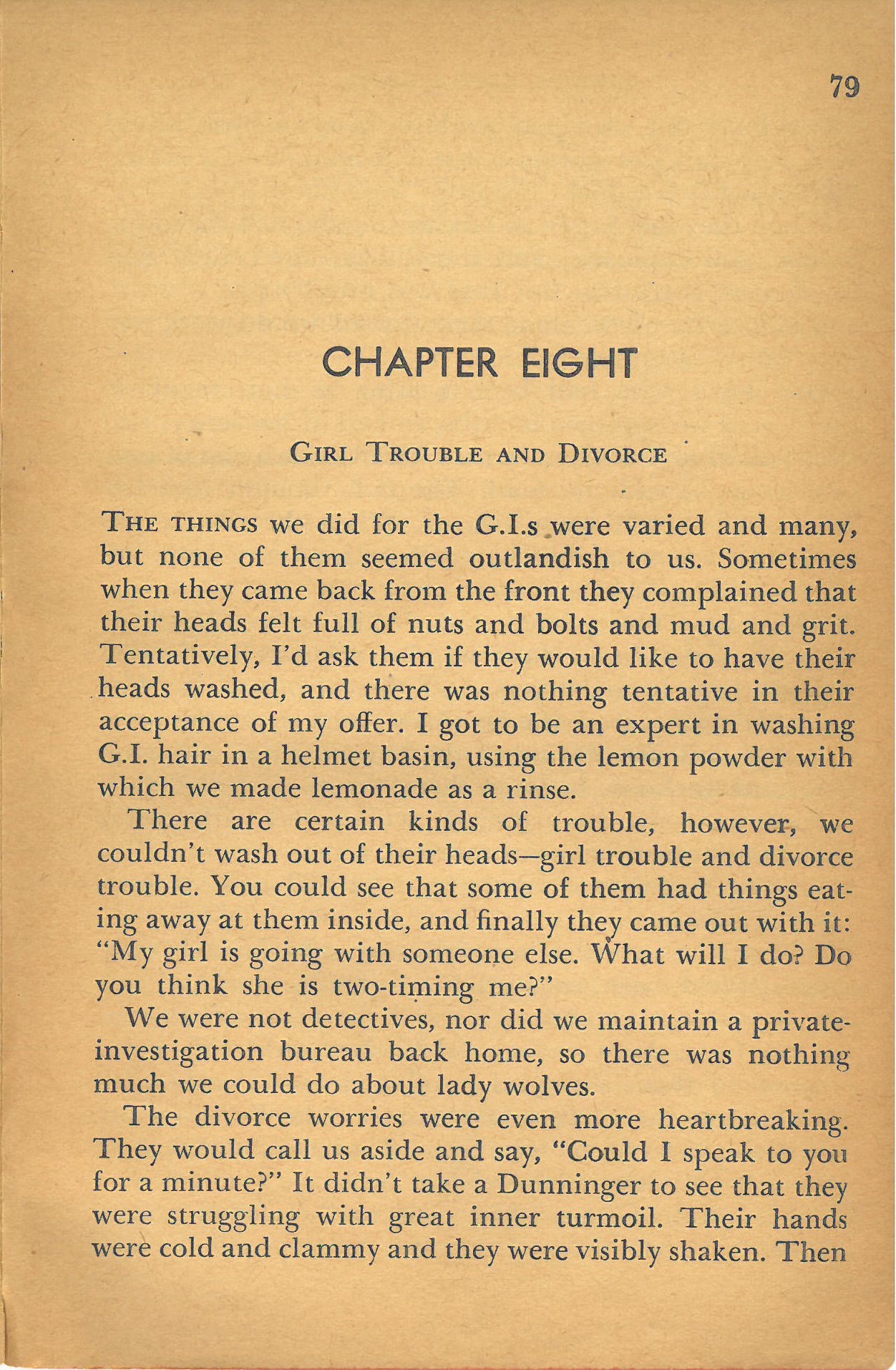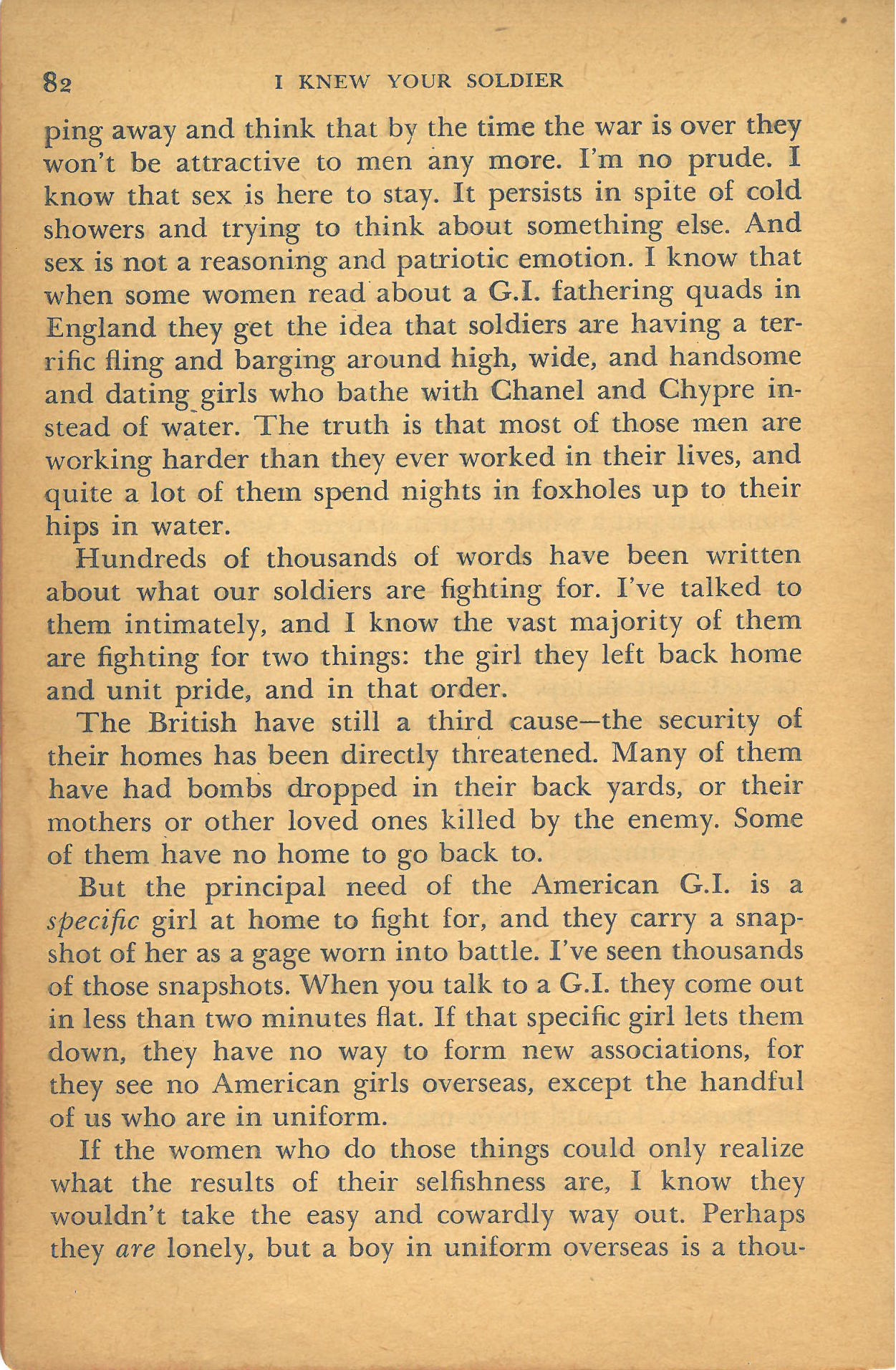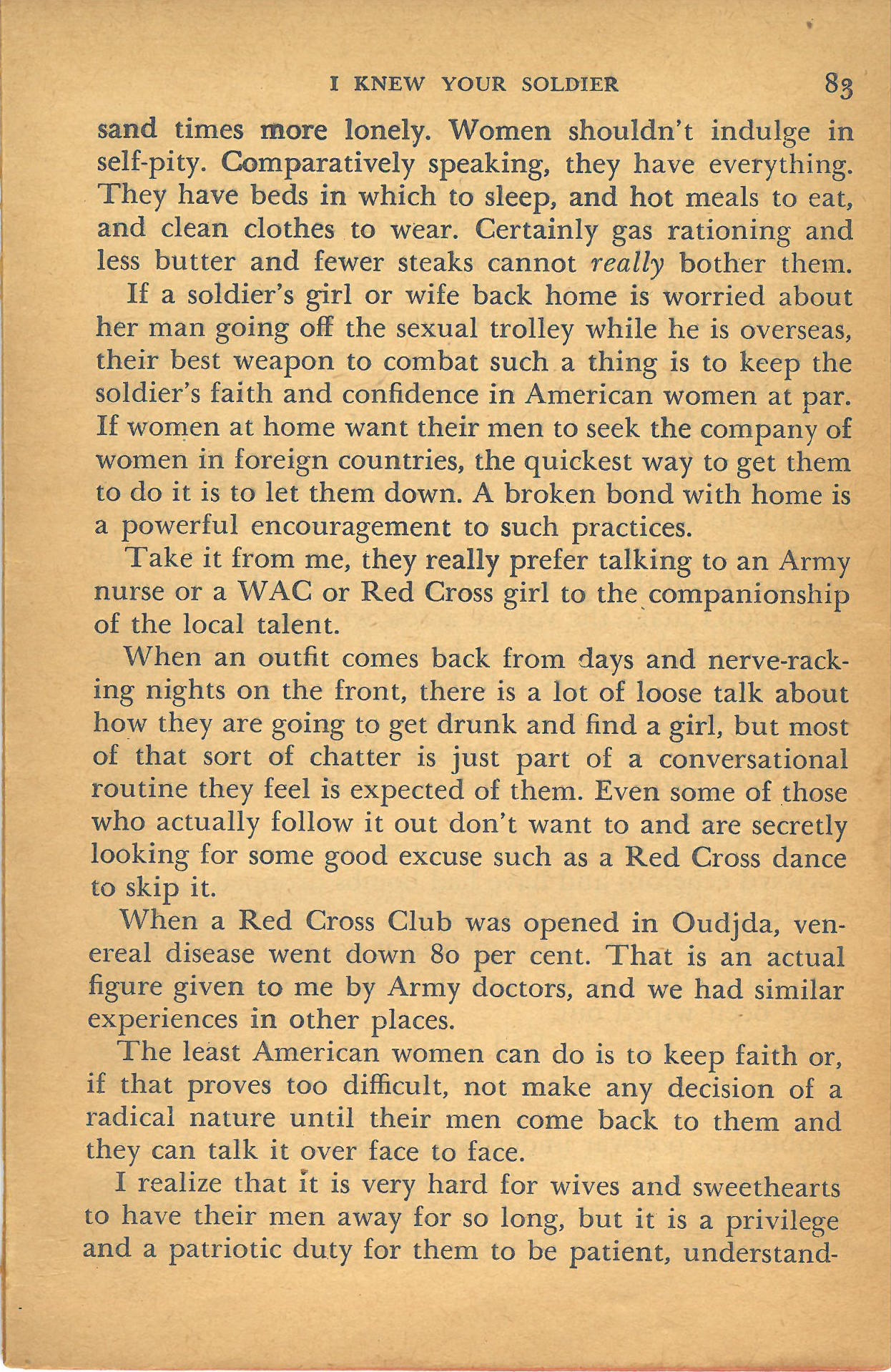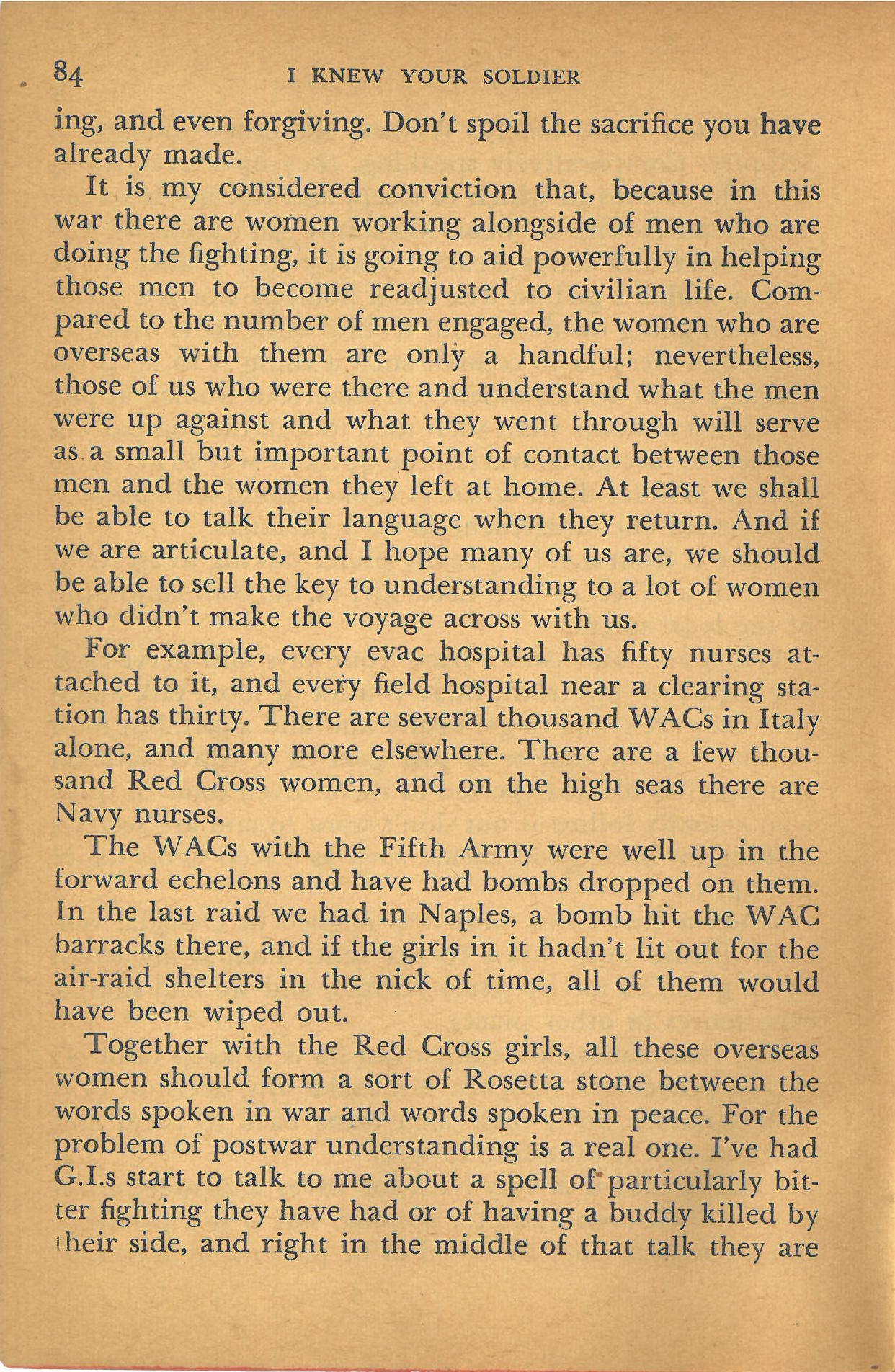|
|
Transcription:
CHAPTER EIGHT Girl Trouble and Divorce
The Things we did for the G.I.s[8] were varied and many, but none of them seemed outlandish to us. Sometimes when they came back from the front they complained that their heads felt full of nuts and bolts and mud and grit. Tentatively, I’d ask them if they would like to have their heads washed, and there was nothing tentative in their acceptance of my offer. I got to be an expert in washing G.I. hair in a helmet basin, using the lemon powder with which we made lemonade as a rinse. There are certain kinds of trouble, however, we couldn’t wash out of their heads- girl trouble and divorce trouble. You could see that some of them had things eating away at them inside, and finally they came out with it: “My girl is going with someone else. What will I do? Do you think she is two-timing me?” We were not detectives, nor did we maintain a private investigation bureau back home, so there was nothing much we could do about lady wolves.[9] The divorce worries were even more heartbreaking. They would call us aside and say, “Could I speak to you for a minute?” It didn’t take a Dunninger[10] to see that they were struggling with some great inner turmoil. Their hands were cold and clammy and they were visibly shaken. Then they’d burst out with pent-up bitterness, and you would find they had just gotten a letter from a lawyer asking for the wife’s freedom. When they first began to talk to you about it they were violent and explosive, and the things they called their wives were corrosive. But that was usually just a front and before they were done their throats would work and they would weep unashamed. One boy’s wife had been writing to him regularly every week for eighteen months, and all her letters had been full of love and tenderness. Then came a gap of four or five weeks with no mail. The G. I. thought that her letters had merely been delayed. When the silence was broken it was smashed wide open with a letter from her lawyer asking for her divorce. These were not isolated cases, for in one mail call for a company[11] of 150 men there were five requests for divorce, two of them from lawyers, and three from wives. The legal documents from the lawyers seemed to me the more heartless and devastating of the two varieties, although it is hard to choose between them. Such incidents are especially widespread with outfits that have been overseas as much as a year or more. The commander[12] of one company said that he had six such cases in one week. Then there were the “my girl’s married somebody else” cases. “We’d been engaged for eighteen months,” one boy repeated over and over, “and she promised to wait for me. I just don’t understand it.” Nor did I. Some of them shrugged it off and were hard-boiled about it on the surface and wore a “there’s lots more where she came from” false front. But basically they were just as deeply hurt as the violent ones. Such running out on obligations on the part of women at home was so universal that the 1st Armored Division[13] established a Broken Hearts Club, in an effort to help its members carry such emotional solar plexus blows off with an “I don’t care” attitude. To me it was an essentially pathetic organization all the same. I feel very deeply about such broken ties- more deeply, I think, than anything else I ran into overseas. Some of the things a soldier’s woman at home do to him seem to me a peculiarly vicious form of sabotage. Aside from the considerations of faith and loyalty and trust involved, such a running out on men in uniform is unpatriotic and makes bad soldiers of the men it happens to. This form of slackerism on the part of the women back home can put a whole unit in danger. One company commander told me that his top sergeant and his staff sergeant, the two men who were the backbone of his outfit,[14] were of no earthly use to him any more. “I ought to break them,” he said, “but I just can’t, for I know what has caused their slump. With one of them, his girl has married someone else. With the other, his wife has asked for a divorce.” The lack of spirit in those two men had infected the whole company and had dropped its morale sharply. A G.I. came to Ted Andreas, one of our field directors, to talk over with him a divorce his wife had requested. Ted told me, “It’s a hard thing to see a man who’s lost part of his body, but it’s even harder to see a man who has lost his spirit. Shortly after that I heard he had been wounded and I went to see him. When I got there he was dead. When we checked over his things we found a crumpled, blood-stained letter from his wife’s lawyer in his pocket. I could never make up my mind whether he had deliberately walked in front of death or not.” I try to understand such women. But it isn’t easy. Maybe they tell themselves, “He’ll be killed, and I won’t have anything left.” Perhaps they feel their youth slipping away and think that by the time the war is over they won’t be attractive to men any more. I’m no prude. I know that sex is here to stay. It persists in spite of cold showers and trying to think about something else. And sex is not a reasoning and patriotic emotion. I know that when some women read about a G.I. fathering quads in England[15] they get the idea that soldiers are having a terrific fling and barging around high wide, and handsome[16] and dating girls who bathe with Chanel and Chypre[17] instead of water. The truth is that most of those men are working harder than they ever worked in their lives, and quite a lot of them spend nights in foxholes[18] up to their hips in water. Hundreds of thousands of words have been written about what our soldiers are fighting for. I’ve talked to them intimately, and I know the vast majority are fighting for two things: the girl they left back home and unit pride, and in that order. The British have still a third cause- the security of their homes has been directly threatened. Many of them have had bombs dropped directly in their back yards [sic], or their mothers or other loved ones have been killed by the enemy.[19] Some of them have no home to go back to. But the principal need for the American G.I. is a specific girl at home to fight for, and they carry a snap of her as a gage[20] worn into battle. I’ve seen thousands of these snapshots. When you talk to a G.I. they come out in less than two minutes flat. If that specific girl lets them down, they have no way to form new associations, for they see no American girls overseas, except the handful of us who are in uniform. If the women who do those things could only realize what the results of their selfishness are, I know they wouldn’t take the easy and cowardly way out. Perhaps they are lonely, but a boy in uniform overseas is a thousand times more lonely. Women shouldn’t indulge in self-pity. Comparatively speaking, they have everything. They have beds in which to sleep, and hot meals to eat, and clean clothes to wear. Certainly gas rationing and less butter and fewer steaks cannot really bother them.[21] If a soldier’s girl or wife back home is worried about her man going off the sexual trolley while he is overseas, their best weapon is to keep the soldier’s faith and confidence in American women at par. If women at home want their men to seek the company of women in foreign countries, the quickest way to get them to do it is to let them down. A broken bond with home is a powerful encouragement in such practices. Take it from me, they really prefer talking to an Army nurse[22] or a WAC[23] or a Red Cross girl to the companionship of the local talent. When an outfit comes back from days and nerve-wracking nights on the front, there is a lot of loose talk about how they are going to get drunk and find a girl, but most of that sort of chatter is just a part of the conversational routine they feel is expected of them. Even some of those who actually follow it out don’t want to and are secretly looking for some good excuse such as a Red Cross dance[24] to skip it. When a Red Cross Club[25] opened in Oudjda,[26] venereal disease went down by 80 per cent. That is an actual figure given to me by Army doctors, and we had similar experiences in other places. The least American women can do is to keep faith or, if that proves too difficult, not make any decision of a radical nature until their men come back to them and they can talk it over face to face. I realize that it is very hard for wives and sweethearts to have their men away for so long, but it is a privilege and a patriotic duty for them to patient, understanding, and even forgiving. Don’t spoil the sacrifice you have already made. |
[1] Eleanor Stevenson and Pete Martin, I Knew Your Soldier (New York: Penguin Books, 1945), 3-7.
[2] Stevenson and Martin, I Knew Your Soldier, 3-13.
[3] “WWII Services to the Armed Forces (SAF) | American Red Cross.” Accessed 1 July 2016. Source.
[4] “WWII Services to the Armed Forces (SAF) | American Red Cross.” Accessed 1 July 2016. Source.
[5] Stevenson and Martin, I Knew Your Soldier.
[6] Doris Weatherford, American Women and World War II. History of Women in America (New York: Facts on File, 1990).
[7] Weatherford, American Women and World War II.
[8] G.I. is a slang term, which was commonly used in World War II, and since, to describe soldiers. Typically, it is understood that G.I. stood for “General Issue” which was the designation for equipment owned by the military and issued to the troops. It can be seen as a way of saying that low-ranking soldiers were seen as equivalent to tools and equipment by the military bureaucracy. In popular use, it simply means a soldier, usually enlisted and of relatively low rank, rather than an officer.
[9] Men who habitually made aggressive sexual advances towards women were commonly called “wolves.” Here, Stevenson either appears to be referring to women who behaved sexually aggressive, or is referring to the men who chased already attached women as “lady wolves” (“Wolf – Definition of Wolf by The Free Dictionary.” Accessed 6 July 2016. Source).
[10] Joseph Dunninger (1892-1975) was a mentalist, a magician and entertainer, who claimed to be able to read people’s minds. He was very well known, with an active presence on both radio and television, and was never found to have used assistants or any fraud or trickery to achieve his results. He performed for such notables as Theodore Roosevelt and Thomas Edison, and a poll from the 1940s found that his voice was more recognizable than the President’s (“Joseph Dunninger – Biography | All About Magicians.com.” All About Magicians. Accessed 1 July 2016. Source).
[11] A company is the fourth smallest Army unit, of about 100 to 250 men. In order, the smaller units of Army troops are: Sections (4-12 men), Squads (two or more sections), Platoons (two or more squads) and Companies (two or more platoons). (“Army Ranks on Symbols & Insignias of the United States Army.” Accessed 5 July 2016. Source.; “Army Units & Sizes.” Accessed 5 July 2016. Source).
[12] A company is typically led by a Captain or a Major; “commander” here simply means the leader of the company, and is not an actual Army rank designation (the U.S. Navy does use the rank Commander).(“Army Ranks on Symbols & Insignias of the United States Army.” Accessed 5 July 2016. Source.; “Army Units & Sizes.” Accessed 5 July 2016. Source).
[13] A Division is an Army unit made up of generally 10,000 to 15,000 men, and led by either a Lieutenant General or a Major General. It is the third largest unit of the army. The larger army units are Battalions (four or more companies), Regiments (two or more Battalions), Brigades (three or more Battalions), Divisions (three or more Brigades or Regiments), Corps (two or more Divisions), and Army (two or more Corps) (for details on units smaller than a Battalion, see footnote 5).
The 1st Armored Division was activated on 15 July 1940, under the command of Major General Bruce Magruder, and was deployed overseas in May 1942 to the European theatre. They fought in North Africa and the Mediterranean, with major operations including Tunisia, Naples-Foggia, Rome-Arno, North Apennines, and Po Valley. They landed at Oran, where Eleanor Stevenson was stationed, and they later also fought at the Anzio Beachhead, where she served the men in the midst of combat. The Division received three distinguished service unit citations, and several other awards. They returned to the United States and were inactivated in April 1946 (“World War II Divisional Combat Chronicles.” Accessed 5 July 2016. Source.; “Army Ranks on Symbols & Insignias of the United States Army.” Accessed 5 July 2016. Source.; “Army Units & Sizes.” Accessed 5 July 2016. Source).
[14] The company commander would have been an Officer, holding the rank of Captain or Major. Sergeants and Staff Sergeants are enlisted ranks. The U.S. Army website described the difference between enlisted and Officers thusly: “Enlisted Soldiers are the backbone of the Army. They have specific specialties within an Army unit. Officers act as managers to those Soldiers. They plan missions, give orders, and assign Soldiers to tasks.” More concretely, Officers are the commanders of the army, and generally attended a service academy, such as West Point, or Officer Candidate School. Enlisted are people who simply enlist, or join up in the army. Like Officers, who start out their careers as lowly Second Lieutenants, enlisted soldiers can advance in rank. These advancements will give them jobs that might lead them to command other troops, but they will always be under the direction of an Officer. Sergeant is the fifth enlisted rank, while Staff Sergeant is the sixth (“Army Ranks on Symbols & Insignias of the United States Army.” Accessed 5 July 2016. Source.; “Difference between Enlisted Soldiers and Officers.” Goarmy.com. Accessed 6 July 2016. Source).
[15] Despite Stevenson’s attempt at underselling the sexual activity of men stationed overseas, there was a great deal of it. According to the Baltimore Sun: “It is estimated that tens of thousands of children were fathered by U.S. soldiers stationed in England during the war. Soldiers were not discouraged from taking lovers and even received condoms from the military. Their sexual activity became part of the folklore in the English countryside. According to one account, signs were sometimes posted warning the U.S. soldiers, ‘Please drive carefully. That child might be yours.’” During World War I an anonymous survey was done among American soldiers in France where one third of the soldiers admitted an occasional sexual liaison, while another third “took advantage of every opportunity for sexual relations.” Given that World War I was generally a more conservative time in terms of sexaul behavior than World War II, it seems likely that a survey of soldiers in the latter would reveal the same or even higher amounts of sexual activity (Michael Ollove, “Children of GIs from World War II Get U.S. Help at Last.” The Baltimore Sun, 1 January 1991. Source.;Doris Weatherford, American Women and World War II. History of Women in America (New York: Facts on File, 1990) 255).
[16] “High, wide and handsome” was a common twentieth century slang term meaning expansive and impressive. It may have initially referred to a horse’s gait (“High, Wide and Handsome – Meaning and Origin.” Accessed 1 July 2016. Source).
[17] Chanel and Chypre both refer to perfumes. Chanel is a fragrance started by the designer Coco Chanel, while Chypre is a category of perfumes (“Inside CHANEL.” Inside Chanel. Accessed 6 July 2016. Source).
[18] A foxhole was a type of military fortification in WWII that is generally defined as “A small pit providing protection from enemy fire, usually for one or two persons, while allowing effective fire from within.” A foxhole would be deep enough that a man (usually just a single person) could stand upright in it with only his head and shoulders exposed, and wide enough at the bottom that he could be protected from enemy fire or artillery. Like the trenches of WWI, foxholes were often miserable places to be, full of mud and standing water (“Foxhole | Academic Press Dictionary Of Science An… – Credo Reference.” Accessed 7 July 2016. Source).
[19] This would be referring to the bombing raids carried out by Germany against Britain during 1940 and 1941, usually known as the Blitz or the Battle of Britain. Though the German air force, called the Luftwaffe, did begin by attacking military targets, they eventually shifted over to civilian ones, particularly the city of London. Though the British people were prepared for this sort of attack, there were many casualties and a great deal of destruction as a result of the bombings (“World War II – The Battle of Britain | 1939-1945 | Britannica.com.” Accessed 7 July 2016. Source).
[20] Gage: a valued object deposited as a guarantee of good faith.
[21] While Stevenson is correct that combat is generally harder than dealing with rationing, her suggestion that rationing “cannot really bother” women understates the degree to which rationing did drastically affect the lives of many women on the homefront. As Doris Weatherford notes “housework, 1940s style, was often a genuinely full time job. The war emergency made this truth even more real.” In addition to the fact that women were expected to spend time making things that could be sent overseas to the troops there, or helping in the war effort at home, rationing also severely curtailed their ability to do their jobs as housewives for “the tools of [their] trade were taken from [them].” Rationing limited access to necessary staples such as butter, sugar and canned goods. Many substitutes for rationed or unavailable products were more expensive and typically much more time consuming, adding a further burden to women of limited funds and time. Access to many products was further restricted because of gas rationing, which prevented people from going to more distant stores if their own did not have the products they needed. Furthermore, if a woman was a military spouse, she was expected to provide for herself and her family on a very limited budget, $50 dollars a month for a single woman with small additions for each child (Weatherford, American Women and World War II, 200-220).
[22] Over 59,000 American women served in the Army Nurse Corps during WWII and “during the war, nurses served under fire in field hospitals and evacuation hospitals, on hospital trains and hospital ships, and as flight nurses on medical transport planes. The skill and dedication of these nurses contributed to the extremely low post-injury mortality rate among American military forces in every theater of the war. Overall, fewer than 4 percent of the American soldiers who received medical care in the field or underwent evacuation died from wounds or disease.” (“The Army Nurse Corps.” Accessed 7 July 2016. Source).
[23] The Women’s Army Corps, or WAC, was established in 1941, and was the first time women other than nurses could be a part of the U.S. Army. Though they did not serve directly in combat, they did fill a great many necessary support positions, including, but certainly not limited to, “weather observers and forecasters, cryptographers, radio operators and repairmen, sheet metal workers, parachute riggers, link trainer instructors, bombsight maintenance specialists, aerial photograph analysts, and control tower operators.” The WACs eventually had counterparts in the other branches of the service, including the Naval WAVEs (“The Women’s Army Corps.” Accessed 1 July 2016. Source).
[24] Particularly in places more removed from direct combat, such as Oudjda, the Red Cross worked to give the soldiers as many homey comforts and distractions from the horror of war that they could. One of the popular ones were the dances they would host, with local girls and Red Cross women serving as dancing partners for off duty soldiers. Eleanor writes of the dances “a Frenchwoman, with a characteristic French weakness for drama said to one of our girls, ‘How can you dance when our men are dying?’ ‘I was planning to dance with some of them before they died,’ our girl told her. The G.I.s seemed to feel that way about it, too, for the first thing they ask when they come into one of our clubs is, ‘When is there going to be a dance?’” (Stevenson, I Knew Your Soldier, 24).
[25] The Red Cross Clubs were a combination of hotel, cafe and recreation center, depending on where they were and the local conditions and resources. Large ones, such as those in England and Oudjda served off duty soldiers as hotels and recreation centers, while club mobiles, such as those for more far flung units and for units on the front, served coffee and donuts and gave soldiers a chance to talk to an “American girl.” (Stevenson, I Knew Your Soldier).
[26] Eleanor Stevenson was sent to Oudjda, Morocco in 1943 when General Mark Clark established the headquarters of the 5th Army there and requested the services of the Red Cross (Stevenson, I Knew Your Soldier, 21).




